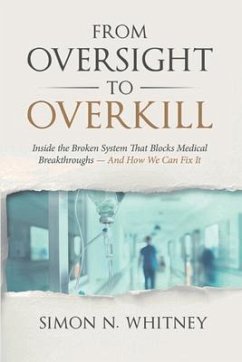Medical research saves lives-yet all too often, it is thwarted by a review system supposed to safeguard patients that instead creates needless delays and expense. Institutional Review Boards, which exist at every hospital and medical school that conducts medical research, have ended up imposing such complex, draconian conditions that research is frequently damaged, delayed, and distorted. This is why medical miracles like the COVID-19 vaccines, which were developed at warp speed, are far too rare. Instead, medical research in countless areas is kept at a horse-and-buggy pace. The result: unnecessary suffering and avoidable deaths.
From Oversight to Overkill vividly recounts the story behind this crisis, one that remains unknown to the general public. Family physician and ethicist Simon Whitney shows how the IRB system was launched in response to scandals like the notorious Tuskegee syphilis study-and how, in recent decades, this well-intentioned program has become increasingly bureaucratic, convoluted, and stifling.
Readers will learn how vital breakthroughs in treating conditions from kidney stones to heart attacks and premature birth have been delayed by IRB red tape, forcing doctors and patients to settle for less-effective treatments. They'll see how ill-informed demands from Congressional leaders that regulators "get tough" on scientists have caused respected research institutions to be shut down-with no benefit to the public. And they'll learn about a balanced, common-sense approach to reforming the system that can free scientists from pointless wheel-spinning while still protecting the public from the risks of unethical or careless experimentation.
Until now, the debate about the IRB system's failures has been confined to specialty journals in medicine, law, and ethics. From Oversight to Overkill will finally alert citizens about this little-known crisis with America's medical research system-and what can be done about it.
From Oversight to Overkill vividly recounts the story behind this crisis, one that remains unknown to the general public. Family physician and ethicist Simon Whitney shows how the IRB system was launched in response to scandals like the notorious Tuskegee syphilis study-and how, in recent decades, this well-intentioned program has become increasingly bureaucratic, convoluted, and stifling.
Readers will learn how vital breakthroughs in treating conditions from kidney stones to heart attacks and premature birth have been delayed by IRB red tape, forcing doctors and patients to settle for less-effective treatments. They'll see how ill-informed demands from Congressional leaders that regulators "get tough" on scientists have caused respected research institutions to be shut down-with no benefit to the public. And they'll learn about a balanced, common-sense approach to reforming the system that can free scientists from pointless wheel-spinning while still protecting the public from the risks of unethical or careless experimentation.
Until now, the debate about the IRB system's failures has been confined to specialty journals in medicine, law, and ethics. From Oversight to Overkill will finally alert citizens about this little-known crisis with America's medical research system-and what can be done about it.
Dieser Download kann aus rechtlichen Gründen nur mit Rechnungsadresse in A, D ausgeliefert werden.









